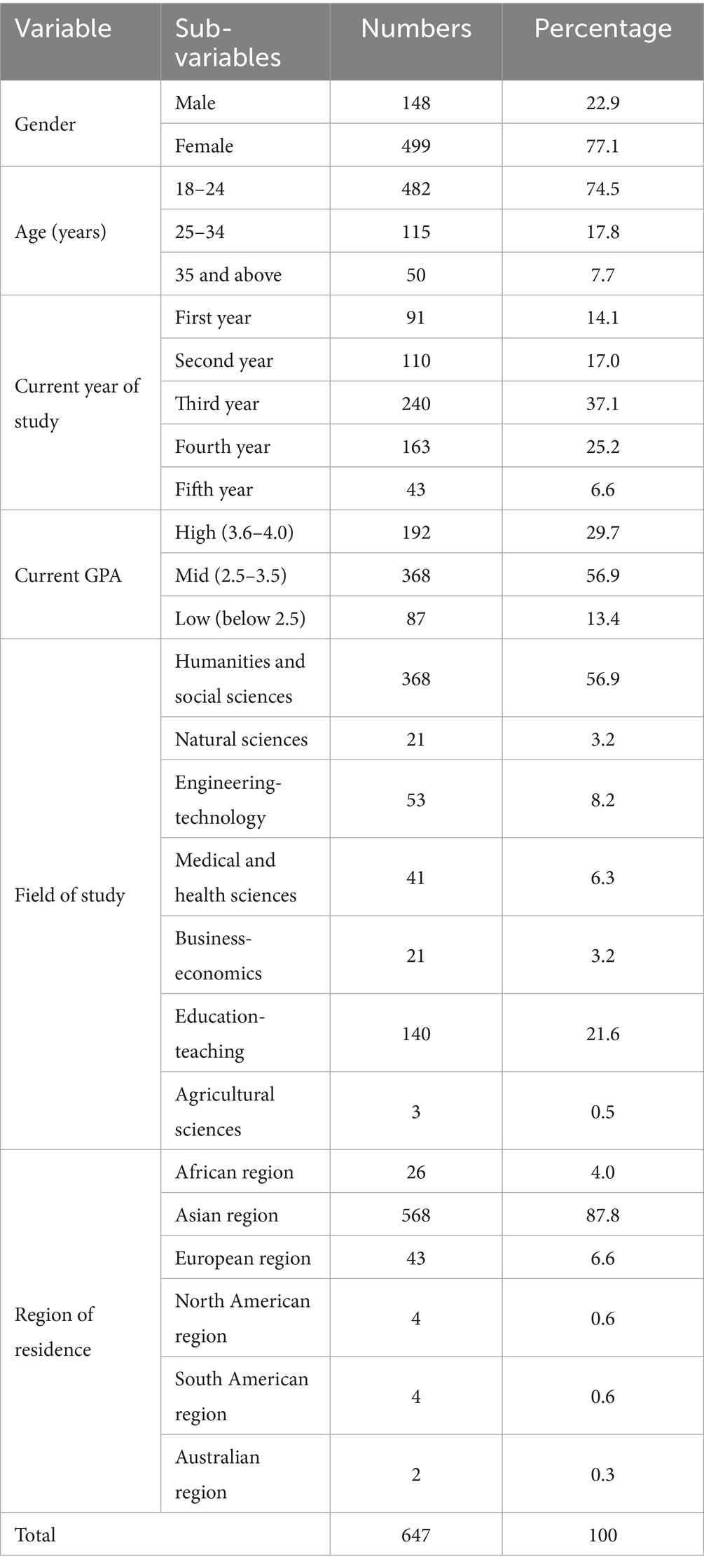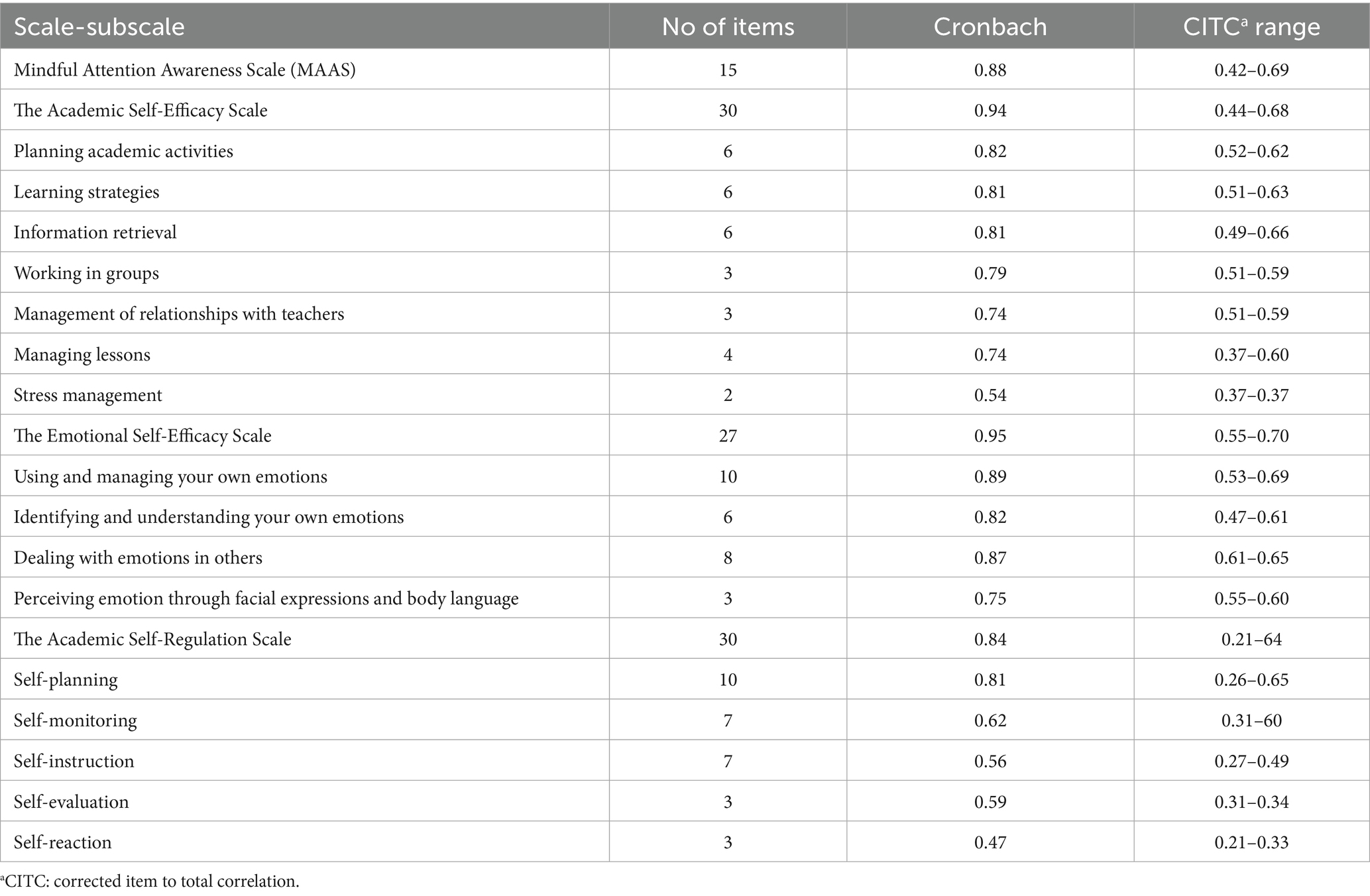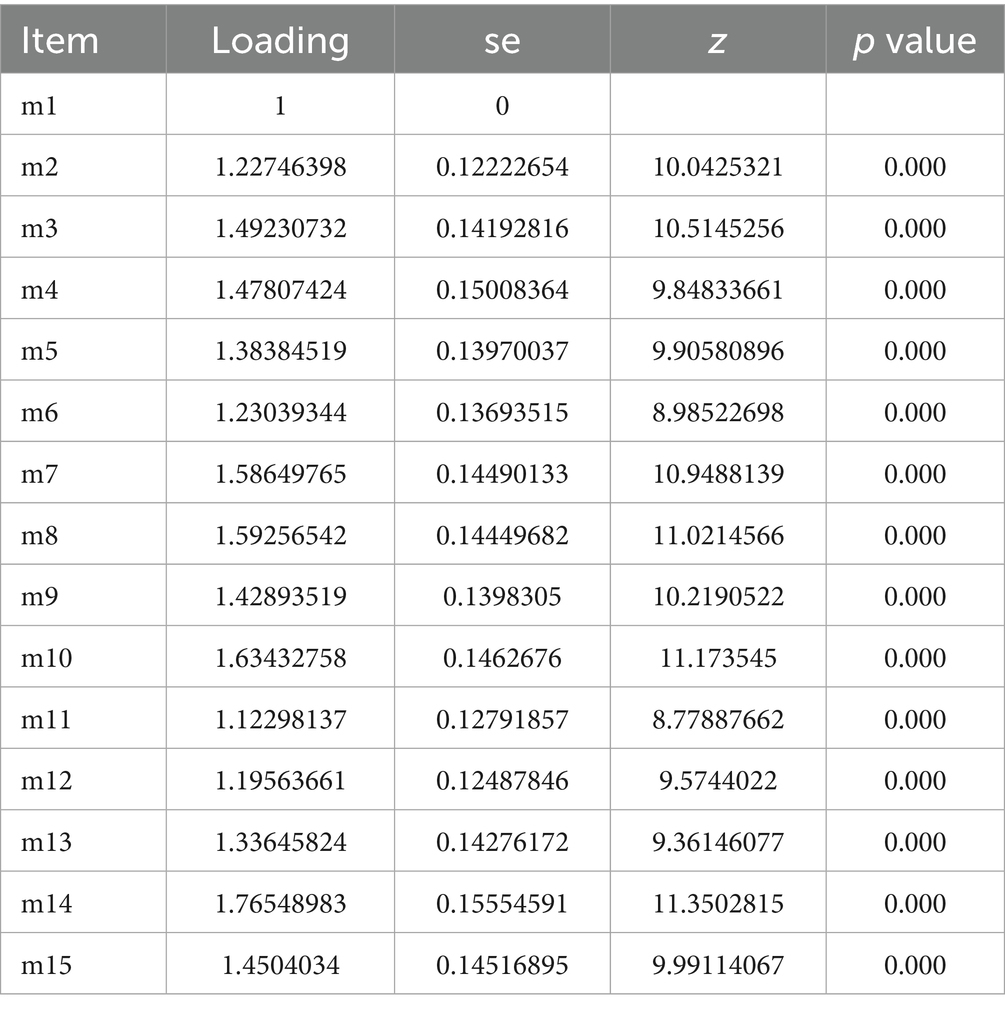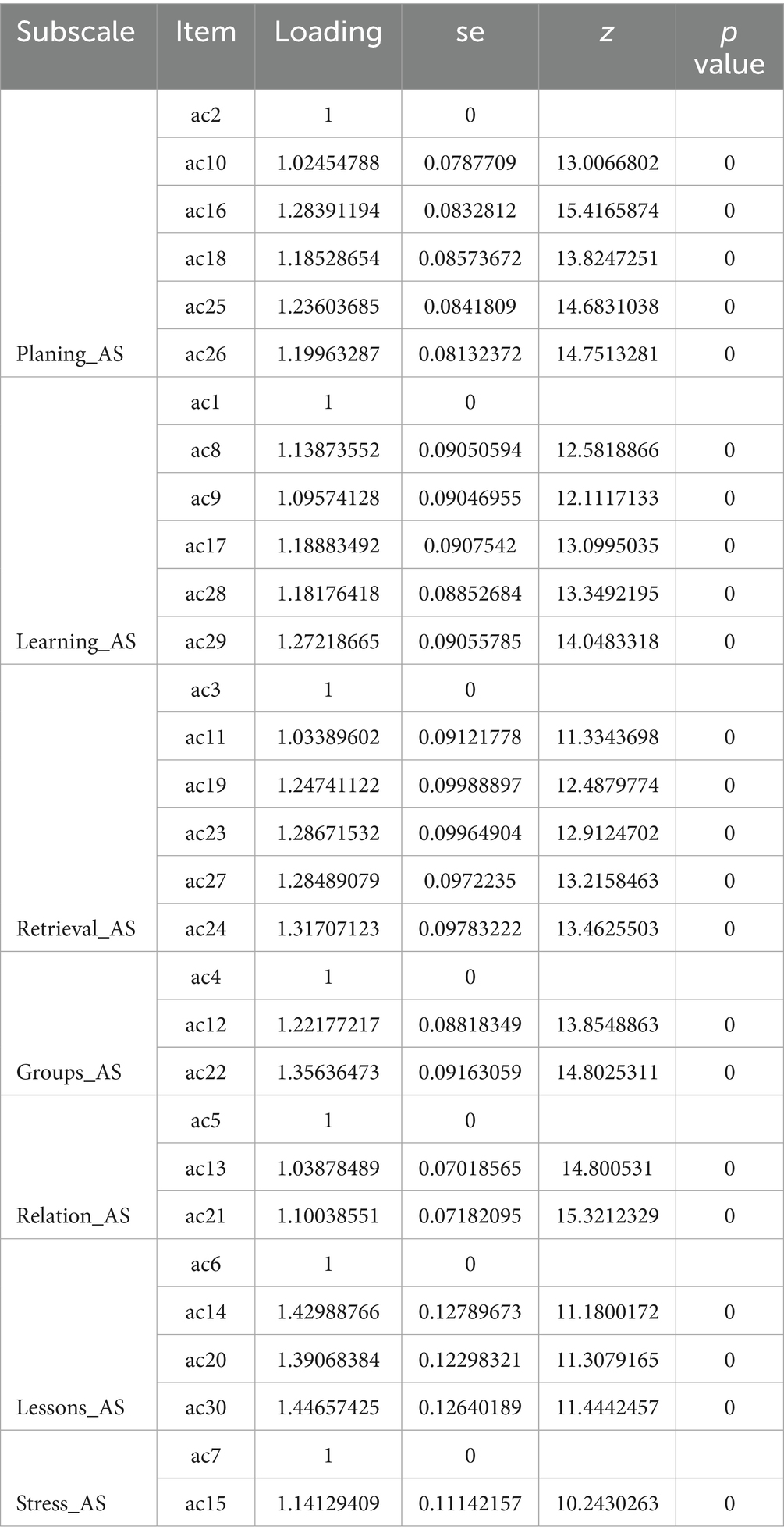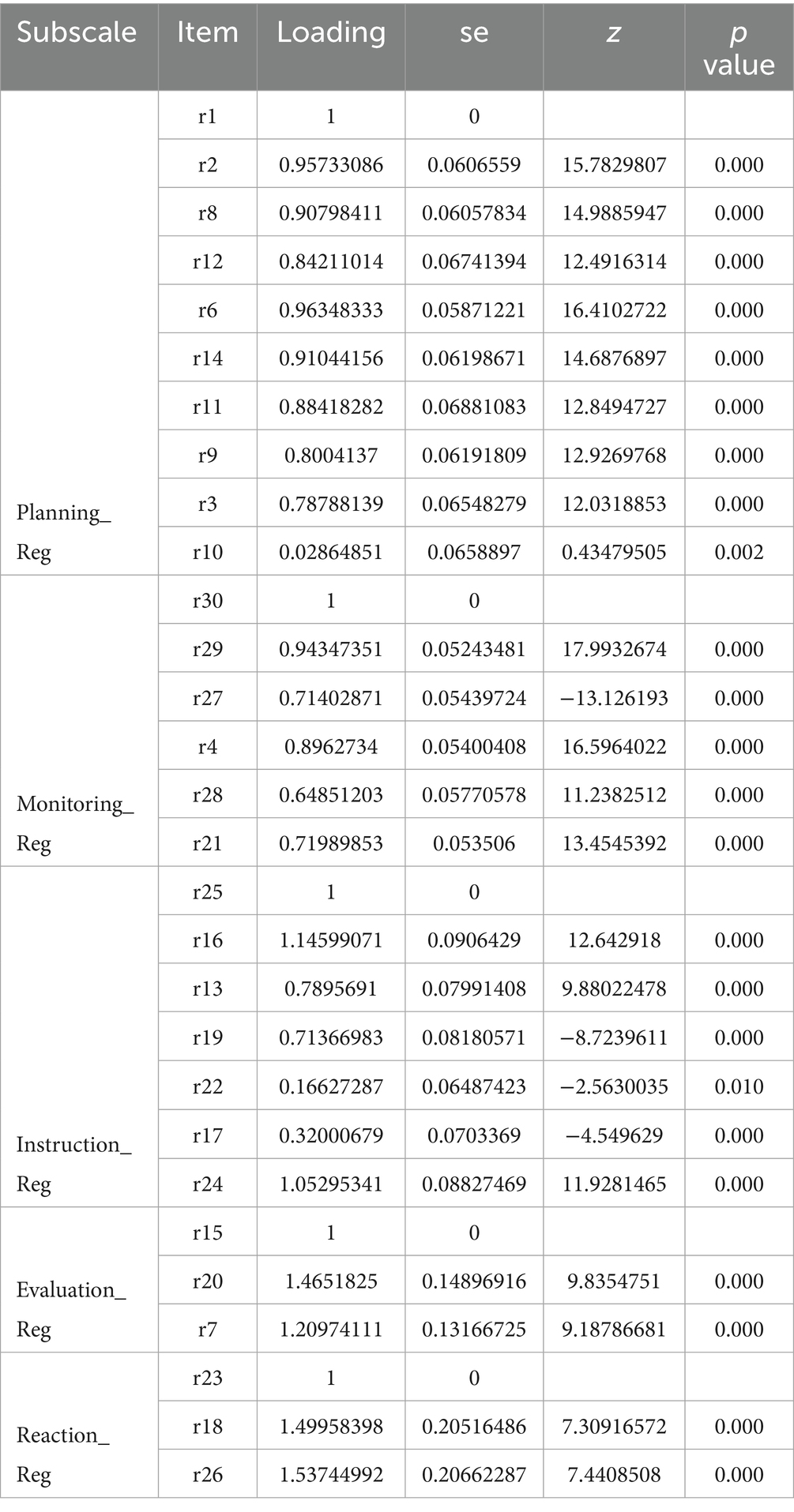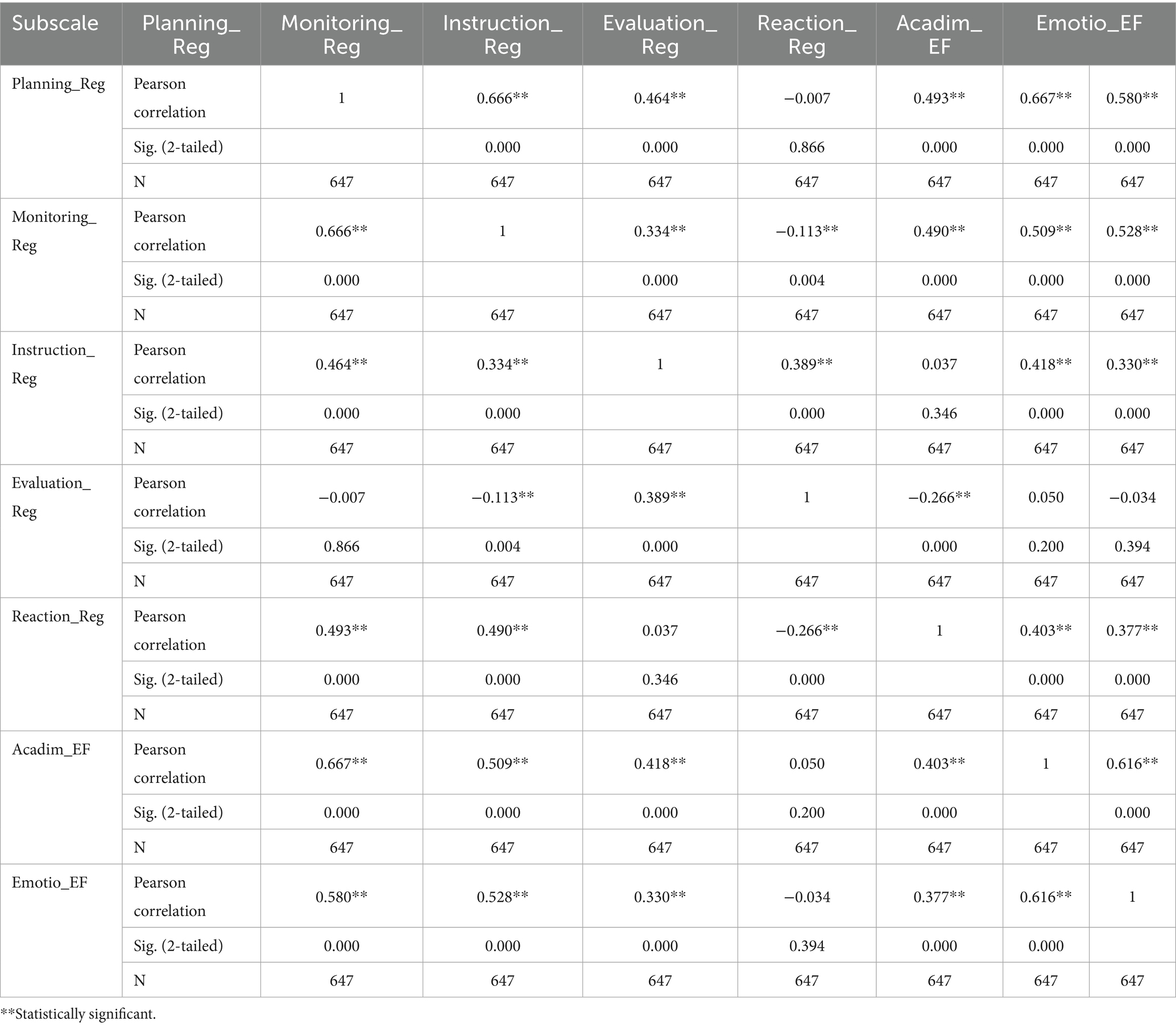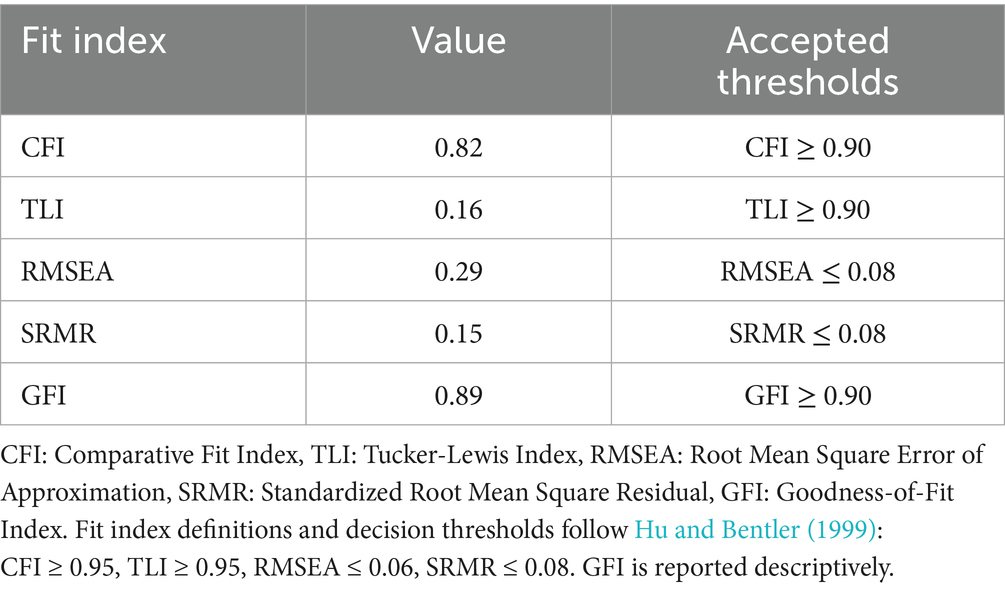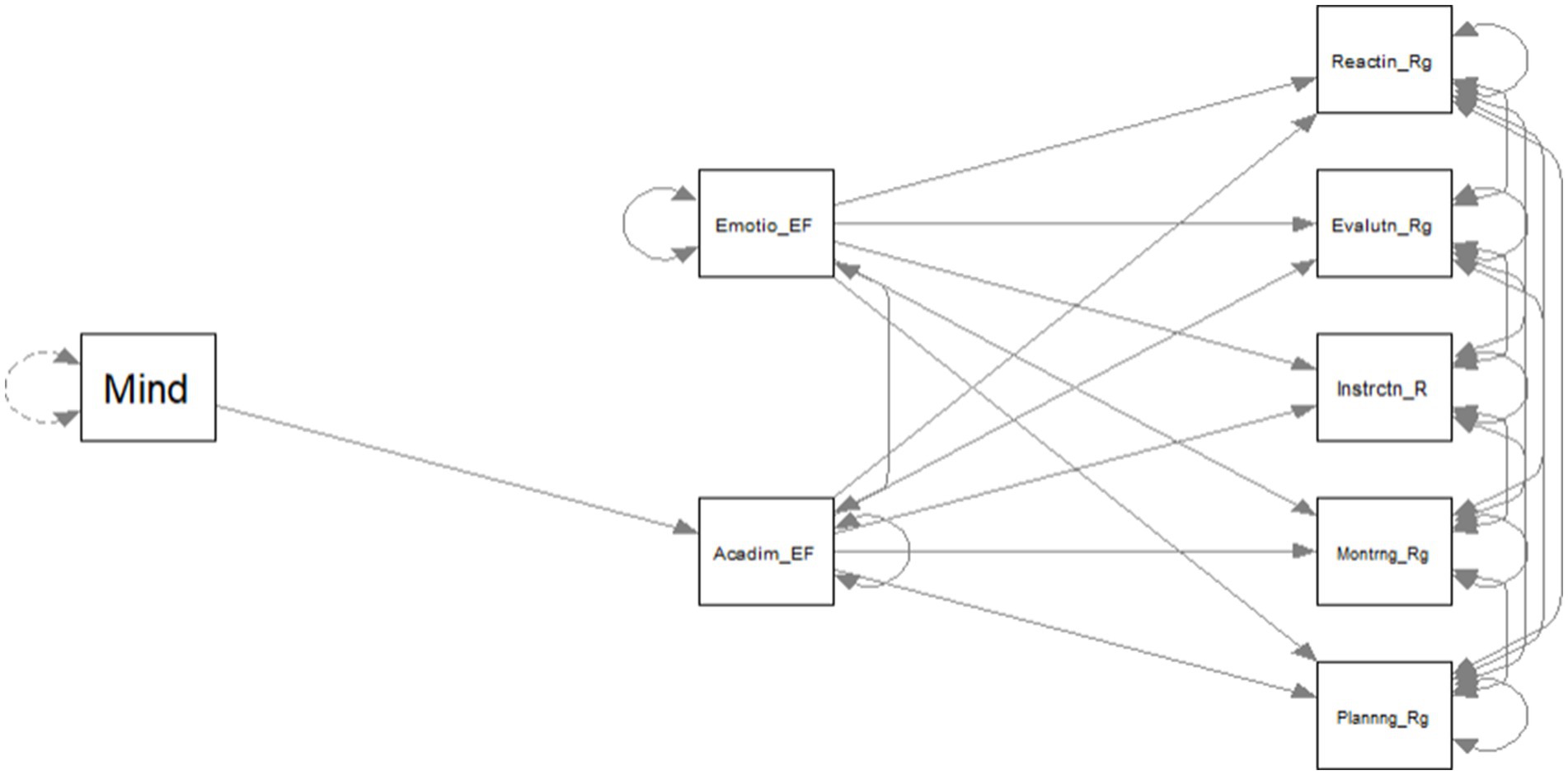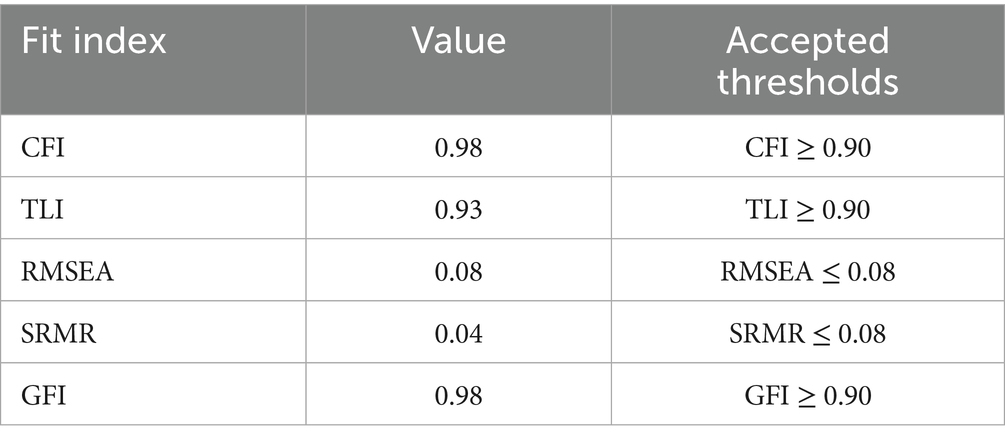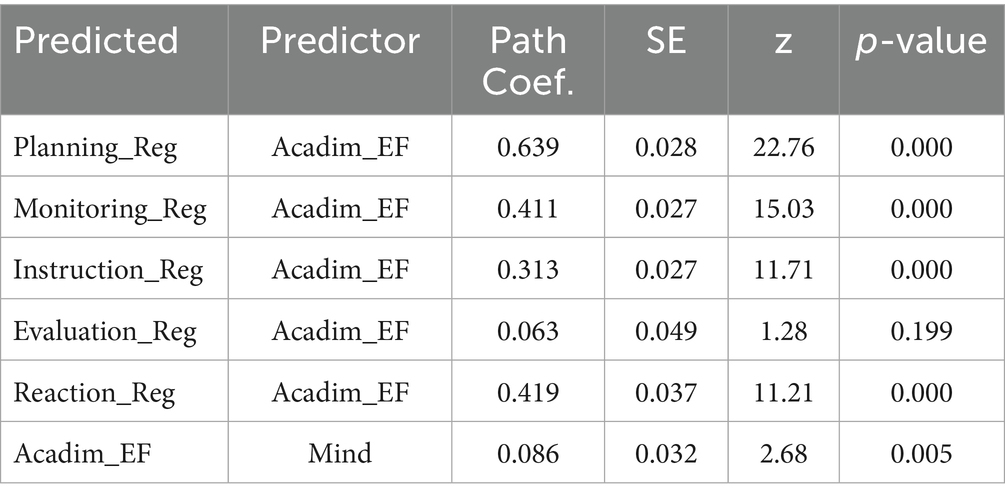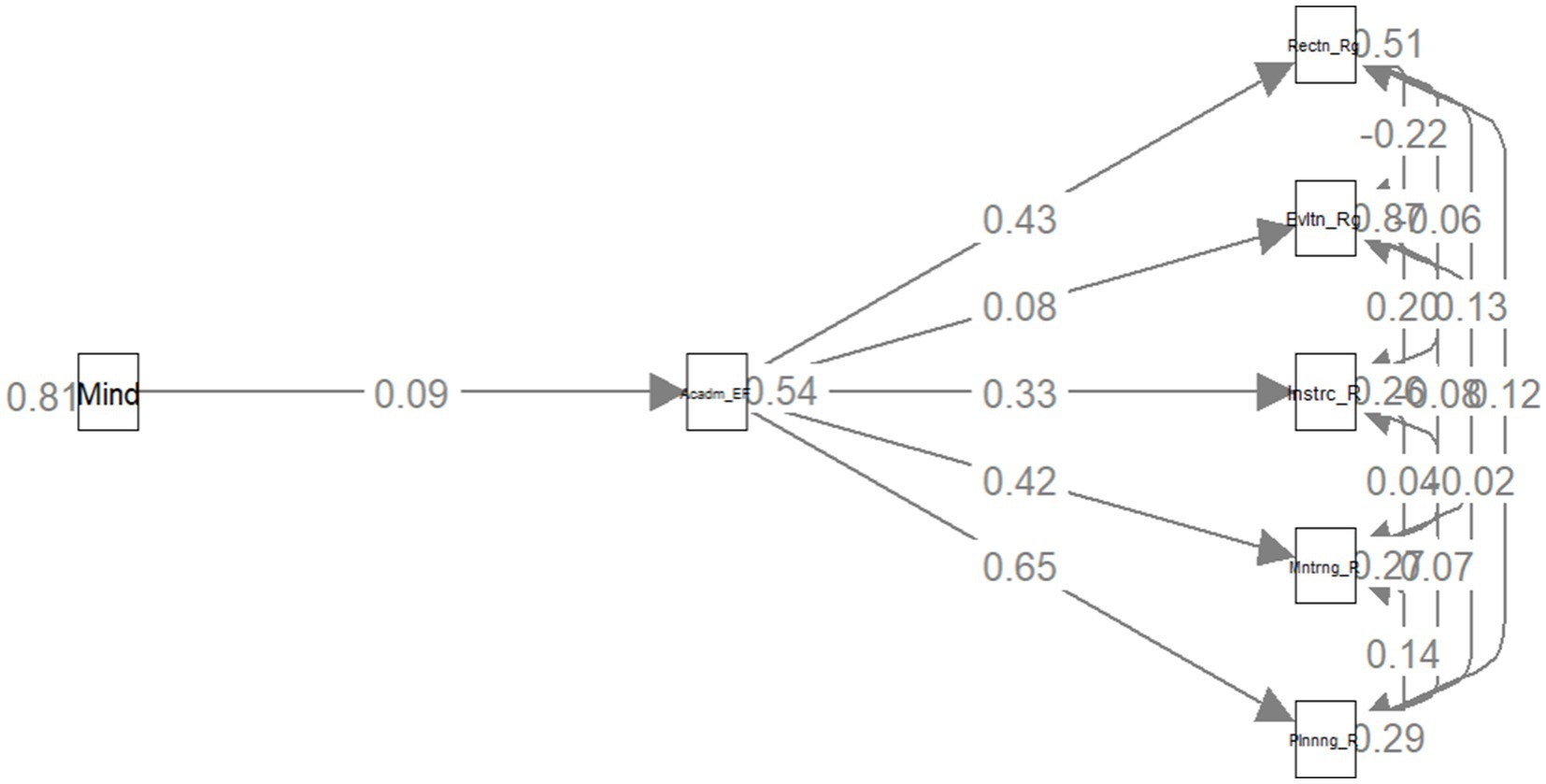- 1Applied Psychology Program, Al Ain University, Abu Dhabi, United Arab Emirates
- 2Postgraduate Professional Diploma in Teaching, Al Ain University, Abu Dhabi, United Arab Emirates
Introduction: Understanding the role of academic and emotional self-efficacy in the relationship between mindful attention awareness and academic self-regulation among university students can help enhance students’ academic performance and well-being by illuminating the psychological processes linking mindful attention awareness to academic self-regulation. Studies link mindfulness with self-regulation; however, whether academic and emotional self-efficacy mediates this correlation among students has yet to be studied.
Methods: We test a structural model to clarify these relations and their implications for academic performance. This study examined the relationship between mindful attention awareness and academic self-regulation, exploring the mediating roles of academic and emotional self-efficacy. Survey research has been used in the current study. The Mindful Attention Awareness Scale (MAAS), the Academic Self-Efficacy Scale (ASES), the Emotional Self-Efficacy Scale (ESES), and the Academic Self-Regulation Scale (ASRS) were administered with undergraduate students (n = 647), most were female (77.1%), aged between 18 and 24 (74.5%), and enrolled primarily in undergraduate programs (91.8%). Most participants were studying humanities and social sciences (56.9%) and resided in the Asian region (87.8%).
Results: The results showed that academic self-efficacy positively affects self-planning, self-monitoring, self-instruction, and self-reaction. No significant relationship emerged between the self-evaluation subscale of academic self-regulation and academic self-efficacy. Mindful attention awareness did not show statistically significant correlation with emotional self-efficacy.
Discussion: Our study results demonstrate that academic self-efficacy is a key construct linking mindfulness practices and academic self-regulation, but emotional self-efficacy did not mediate the relationship between mindfulness and academic self-regulation, highlighting the need for more rigorous research into its role in academic contexts.
Background
Student academic performance has long been a central focus of educational research, leading to the development of innovative approaches aimed at enhancing academic achievement at the university level (Aldbyani et al., 2024; Alhadabi and Karpinski, 2020; Al Husaini and Shukor, 2022; Alyahyan and Düştegör, 2020). Among the most prominent concepts associated with academic performance and well-being are mindfulness, self-efficacy, and self-regulation. These variables significantly contribute to outcomes related to university students’ academic performance and well-being. Understanding the interaction between these concepts is crucial for developing interventions aimed at enhancing student achievement and well-being.
Self-efficacy is defined as an individual’s belief in their ability to perform the actions necessary to achieve specific outcomes. It has been shown to be correlated to high motivation and improved academic performance. In the current study, we focus on both academic self-confidence and its emotional aspects (Al-Abyadh and Abdel Azeem, 2022; Wasni et al., 2024; Zammitti et al., 2025; Zheng et al., 2021). Academic self-efficacy influences students’ motivation and performance (Olckers and Harumavamwe, 2025; Guo et al., 2025; Zou and Chen, 2025), and emotional self-efficacy is also linked to the ability to overcome stress and emotional challenges (Guo et al., 2025; Yang et al., 2025).
Academic self-regulation (ASR), the student’s ability to manage and control their learning environment and work towards the successful performance of tasks (Hwang and Oh, 2021), is a critical variable for academic success and play a pivotal role in achieving academic achievement and personal development (Bylieva et al., 2021; Fan and Cui, 2024; Hj Ramli et al., 2018; Keye and Pidgeon, 2013; Ma and Ishak, 2024; Peteros, 2024; Salleh et al., 2021; Williams, 2020).
Mindfulness involves being fully present in the moment with a sense of open, nonjudgmental acceptance and it is associated with mental health and cognitive performance among university students (González-Martín et al., 2023). It refers to awareness of emotional processes and brain functions and focusing on the present moment (Fakılı and Özdemir, 2024). Mindful attention awareness is associated with psychological well-being and active engagement in academic activities. Badawy’s (2023) study showed that mindfulness predicts increased academic engagement among university students. Menges and Caltabiano (2019) reported that mindfulness training led to significant improvements in academic self-efficacy and psychological well-being among university students. Despite these findings, the mechanisms by which mindful attention awareness affects learning responses have not been sufficiently explored, particularly the mediating roles of academic and emotional self-efficacy. It is important to consider research in this area and reflect the findings of this research in developing targeted interventions that promote effective learning strategies in higher education.
Several studies highlight the relationship between mindfulness, self-efficacy, and academic self-regulation, particularly among undergraduate students (Fan and Cui, 2024; Hj Ramli et al., 2018; Keye and Pidgeon, 2013; Salleh et al., 2021; Williams, 2020). The effect of mindfulness on academic self-regulation has been documented in a number of studies (Abdollahi and Isanejad, 2024; Khng, 2023; Ojell et al., 2023; Razza and Brann, 2025), but the pathways through which mindful attention awareness affects academic self-regulation are not fully elucidated. Specifically, the potential mediating roles of emotional and academic self-efficacy in this relationship warrant further research to enhance the learning process in higher education institutions.
The current study is based on social cognitive theory (Bandura, 1986), which addresses the interaction between personal, behavioral, and environmental factors. Some studies indicate the role of mindfulness in developing self-efficacy, which enhances self-regulation. Fan and Cui (2024) found that mindfulness and self-efficacy independently predicted psychological well-being, and self-regulation among Chinese learners of English as a foreign language. In addition, Aldbyani et al. (2024) highlighted the mediating role of academic self-efficacy in the relationship between mindfulness and academic competence among international students.
By explaining the mediating roles of academic self-efficacy and emotional self-efficacy in the relationship between mindful attention awareness and academic self-regulation, the current study provides insight for educators in the higher education sector. Understanding the mechanism by which academic and emotional self-efficacy influence the relationship between mindful attention awareness and academic self-regulation can help design mindfulness intervention programs aimed at enhancing students’ beliefs in efficacy, goal attainment, and self-regulation skills, thus contributing to improved academic performance and well-being in undergraduate students. This study aims to achieve two objectives: (1) to examine the relationship between mindful attention awareness and academic self-regulation; and (2) to investigate the mediating role of academic and emotional self-efficacy in this relationship. We hypothesize that mindful attention awareness is statistically significant predictor of academic self-regulation and academic and emotional self-efficacy have a positive mediating effect the relationship between mindful attention awareness and academic self-regulation.
Literature review
Mindful attention awareness and its relationship to academic self-regulation
Mindful attention awareness involves paying attention to the present moment without judgment, trust, acceptance, and patience (Brown et al., 2025). It is a mental state of paying attention and awareness to events occurring in the present, shifting attention to what is happening now in an accepting and non-judgmental manner. It is the ability to focus attention on an experience occurring in the present moment in a non-judgmental manner, accepting the present experience rather than attending to memories, future planning, worrying, or even acting automatically without awareness. With a high level of awareness and focus on the present moment, acknowledging and accepting it without preconceived notions about the situation or emotional reactions, understanding oneself more clearly and better, freeing oneself from previous mental constructs, seeing and understanding others more clearly, and living in a way that is joyful and fulfilling (Treves et al., 2024). Academic self-regulation refers to a student’s ability to manage his/her own learning processes. He/She can set academic goals, monitor progress toward achieving those goals, and adjust strategies to meet the demands of specific circumstances and situations (Ham, 2025). The relationship between mindful attention awareness and academic self-regulation is a significant topic of scientific research, as the outcomes of this research are expected to provide specialists with important insights into how to improve students’ academic performance (Milaré et al., 2025).
The role of mindfulness in the educational settings is based on the idea that developing awareness of the present moment reduces stress in student, improves his/her memory, and enhances students’ ability to self-regulate the learning process (Hayat et al., 2025). Academic self-regulation theories assume the importance of goal setting, self-assessment, and self-monitoring in fostering academic success (Milaré et al., 2025). The literature suggests that mindfulness increases academic self-regulation abilities in academic settings (Abdollahi and Isanejad, 2024; Khng, 2023; Ojell et al., 2023; Razza and Brann, 2025). Fan and Cui (2024) found that mindfulness significantly predicted well-being among participants of English as a Foreign Language (EFL) learners, and that self-regulation mediated the relationship between mindfulness and well-being. Their findings suggested that mindfulness may enhance students’ ability to effectively regulate their learning. However, other studies suggest inconsistencies regarding the mediating role of mindfulness. A study of Malaysian students found a strong relationship between academic stress, self-regulation, and mindfulness. Although, mindfulness as a mediator did not have a statistically significant effect on the relationship between academic stress and self-regulation (Hj Ramli et al., 2018). This discrepancy highlights the need for further research to determine the conditions influences self-regulation and to determine the role of potential variables such as cultural context or individual differences.
Farooq and Grewal (2024) investigated the relationship between mindfulness, some symptoms indicative of psychological disorders, and academic success among students. Their study involved 300 male and female high school students. Each participant completed the Five-Factor Mindfulness Questionnaire (FFMQ), which includes the mindfulness dimensions of observing, describing, acting with awareness, awareness of inner experience without judgment, and monitoring emotion. Farooq and Grewal (2024) also noted a statistically significant positive association between mindfulness and academic achievement, suggesting that higher levels of mindfulness improve academic success. The results also showed that mindfulness was negatively associated with psychopathological symptoms, suggesting that it may protect against mental illness. One study that investigated the impact of mindfulness on the academic performance of undergraduate students was conducted by Coo Calcagni and Escartín Solanelles (2018). The study sought to identify the impact of mindfulness on the academic performance of undergraduate students. The study involved 302 psychology students at the University of Barcelona in Spain, who were divided into an experimental and a control group. The results showed that students in the experimental group performed better academically than those in the control group. This demonstrates the role of mindfulness in undergraduate students’ academic performance. Huang (2021) reported that mindfulness can enhance cognitive flexibility in academic tasks. He studied the performance of a group of students on an online problem-solving task; some were asked to be mindful and others were asked to simply act. However, Huang’s sample size was small, and the intervention did not reach the level of formal training. In a quasi-experimental study, Hayat et al. (2025) studied mindfulness among nursing students. The results showed a statistically significant negative correlation between mindfulness and test anxiety (r ≈ −0.30) and a positive correlation with GPA. However, the authors relied on self-report measures and a single academic group, which limits generalizability.
The literature suggests that mindfulness is significantly positively associated with lower academic stress and higher academic performance. However, there are some aspects of these studies that should be taken into account, such as small sample sizes, the potential for more effective intervention programs, limited use of objective performance measures, and limited use of longitudinal studies.
Mindful attention awareness and its relationship to academic and emotional self-efficacy
The history of self-efficacy began with Bandura’s social learning theory. Bandura defined self-efficacy as individuals’ judgments of their own abilities and the regulation of action required achieving specific performance (Bandura and Walters, 1977). According to Bandura (1977), self-efficacy is a student’s belief that they have the ability to perform at a certain level and their confidence in changing life events while taking responsibility for implementing planned behaviors to bring about change and progress. Barnett (2024) argued that self-efficacy judgments for specific skills and general abilities are judgments about what an individual can do given the skills and abilities they possess. Thus, self-efficacy reflects expectations and self-perceptions of competence. Zulkosky (2009) identified the specific components of self-efficacy as cognitive processes by which an individual regulates his or her behavior through deliberate and specific goals. These personal goals are influenced by self-evaluation. Emotional processes are an individual’s beliefs about their abilities to regulate stress and depression they can experience in stressful situations. The locus of control is the individual’s awareness of the causes of events in his or her life and beliefs about internal forces such as effort, personal decisions, and thus the individual’s beliefs about his or her ability to perform a task.
Academic self-efficacy is a sub dimension of general self-efficacy that includes students’ beliefs about their ability to perform academic tasks at specific levels (Zou and Chen, 2025). It is thus the beliefs and judgments about personal achievement of academic goals, assignments, and academic development. It is the development and growth of activities, content, knowledge, interest in learning, and competencies such as research.
Emotional self-efficacy relates to students’ judgments about their abilities to manage their emotions to process emotional information correctly and effectively; it is a power variable that affects a student’s emotional state and performance. The term emotional self-efficacy combines the concept of self-efficacy in Bandura’s theory and the theory of emotional intelligence. Students perceive themselves as having a good balance between emotions and thoughts; they are able to regulate their own emotions, the emotions of others, thoughts, and beliefs in order to provide usable inputs for action. Emotional self-efficacy is a multidimensional concept consisting of self-regulation of emotions, the perception of emotions and using them to support thinking, understanding one’s own emotions, and the emotions of others (Yang et al., 2025).
There is interest in studying the relationship between mindfulness and academic and emotional self-efficacy. Studies have shown a statistically significant positive correlation between mindfulness and self-efficacy (Aldbyani et al., 2024; Badriyah and Hapsari, 2024; Karimi and Barati Hokabadi, 2025; Robin et al., 2025). Badawy’s (2023) study also concluded that academic self-efficacy mediates the relationship between mindfulness and university students’ cognitive and psychological engagement. However, the direction of this relationship has not been clearly studied. While it appears that mindfulness develops self-efficacy, it is possible that students with high levels of self-efficacy may be more likely to pursue mindfulness (Dai, 2024). Aldbyani et al.’s (2024) study demonstrated a statistically significant positive relationship between mindfulness and academic self-efficacy, and the role of mindfulness in enhancing well-being after implementing a short-term intervention program. This is considered an important indicator of the impact of short-term mindfulness-based intervention programs, not just long-term programs.
Regarding studies involving adolescent participants, such as Farooq and Grewal's (2024) study, relied on a cross-sectional design, mindfulness was positively associated with high school grades and inversely associated with psychological distress. A study in the field of sports indicates that developing mindfulness through a training program can reduce anxiety and burnout, while enhancing emotional self-efficacy (Menges and Caltabiano, 2019). Studies on the relationship between mindfulness and academic and emotional self-efficacy have shown that when mindfulness interventions are systematically implemented and combined with efficacy-building activities, students’ self-reports show reduced stress levels, increased resilience, and, in many cases, improved academic performance. All of these findings from the literature provide conceptual support for academic studies. But in conducting longitudinal studies, it is important to acknowledge the causal pathway between mindfulness and self-efficacy. Furthermore, studying the interaction between academic self-efficacy and emotional self-efficacy, and examining them as variables that mediate the relationship between mindful attention awareness and academic self-regulation, is crucial for developing interventions aimed at enhancing student achievement and well-being, and improving mental health and cognitive performance among these students.
Academic and emotional self-efficacy and their relationship to academic self-regulation
Academic and emotional self-efficacy are key determinants of self-regulation. There is a reciprocal relationship between self-regulation and self-efficacy. Academic self-regulation refers to a student’s ability to control and manage the learning environment, work, assume responsibility, and believe in the successful completion of tasks. It is similar to self-directed learning and has a significant impact on cognitive and constructive processes (Hwang and Oh, 2021). Academic self-regulation enables students to independently formulate their own knowledge without relying on others. It reflects the learner’s active participation in the learning process—behavioral, cognitive, motivational, and metacognitive—to enhance learning. Academic self-regulation includes a combination of cognitive and metacognitive skills, such as planning, goal setting, self-control, self-evaluation, and resource management. Students use cognitive-motivational feedback to modify and adapt their strategies and behavior to achieve goals. Learning, control, motivation, behavior, and knowledge (Azari et al., 2024).
A study by Kılıç et al. (2024) demonstrated that self-regulation predicts academic self-efficacy among university students, a finding that has been corroborated by other research (Schunk, 1994; Zhang, 2024). The reciprocal relationship indicates that both self-efficacy and self-regulation influence each other. However, the interaction between these variables is complex. Self-efficacy strengthens and develops self-regulation (Koh et al., 2022; Kryshko et al., 2023; Lee et al., 2014; Travis and Bunde, 2022; Salleh et al., 2021; Yu et al., 2022). Developing self-regulation may strengthen and develop self-efficacy beliefs. Studies attempt to clarify the directionality and dynamic interactions between self-efficacy and self-regulation.
Menges and Caltabiano (2019) showed that Turkish EFL students had moderate to high levels of self-concept, self-efficacy, academic self-regulation, and self-evaluation, with high-achieving students having higher levels of self-regulation, self-evaluation, and academic confidence than lower-achieving students. Correlations between these variables indicated the complex nature of academic self-concept, self-efficacy, and academic self-regulation. Findings from a study by Usán Supervía and Quílez Robres (2021) on the relationship between emotional regulation, self-efficacy, and academic achievement among high school students revealed that study participants demonstrated high levels of emotion regulation, self-efficacy, and academic achievement. The study also found that the effect of the mediating variable self-efficacy on the relationship between emotional regulation and students’ academic performance was statistically significant. These findings suggest that emotional regulation, when associated with high levels of self-efficacy, can lead to improved academic achievement. Previous research has explored the relationship between mindfulness, self-regulation, and academic success, as well as the influence of self-efficacy on academic performance, employing diverse methodologies across different contexts and groups. However, exploring the how academic and emotional self-efficacy affect the relationship between mindful attention awareness and academic self-regulation has not been addressed previously based on our knowledge of previous studies; therefore, we propose a research question, do academic and emotional self-efficacy predict the relationship between mindful attention awareness and academic self-regulation among university students? Which we will examine in the current study.
Methodology
Research approach
The current study explores the relationship between mindful attention awareness and academic self-regulation, taking into account the mediating roles of emotional and academic self-efficacy. A quantitative approach was followed to collect and analyze empirical data.
Research method
Survey research has been used in the current study because it is suitable for measuring quantitative data. Data on mindfulness, academic self-regulation, academic self-efficacy, and emotional self-efficacy were collected from undergraduate students representing Africa, Asia, Europe, North America, South America, and Australia. The survey research design used in the current study is useful for collecting data from undergraduate students to gather insights aligned with the study objectives.
Participants
A convenience sampling approach was employed to select participants for the study. Data were collected by distributing the research instruments-the Mindful Attention Awareness Scale (MAAS), the Academic Self-Efficacy Scale (ASES), the Emotional Self-Efficacy Scale (ESES), and the Academic Self-Regulation Scale (ASRS)-via university email, WhatsApp messages, and Moodle platform. A total of 647 undergraduate students from Africa, Asia, Europe, North America, South America, and Australia participated in the study. We included the participants be university students aged 18 or older; enrolled in undergraduate programs; who provided their electronic consent to participate in the study; and who completed the survey questions. The exclusion was limited to duplicate responses and forms with missing data. The participants were studying at different universities. Demographic information of participants is provided in Table 1.
In Table 1, the researchers revealed that most respondents were female (77.1%), and most students (74.5%) were in the 18–24 age group.
Measuring instruments
The Mindful Attention Awareness Scale (MAAS)
We used the Mindful Attention Awareness Scale (MAAS) to measure the level of mindfulness among undergraduate students. The scale was developed by Brown and Ryan (2003). The MAAS is a self-report instrument designed to measure an individual’s mindfulness of present-moment experiences. The scale consists of 15 items, each of which is worded to reflect a lack of mindfulness (e.g., “I drive places on “automatic pilot” and then wonder why I went there.”). Participants respond using a six-point Likert scale, ranging from 1 (“Almost Never”) to 6 (“Almost Always”). All items in the scale are reverse-scored, meaning that higher scores indicate a higher level of awareness and attention.
The Academic Self-Regulation Scale (ASRS)
To assess students’ self-regulated learning strategies, we used the Academic Self-Regulation Scale (ASRS) (Akhtar and Mahmood, 2013). The scale consists of 30 items, each representing a behavior related to academic self-regulation. The subscales are: self-planning, self-monitoring, self-instruction, self-evaluation, and self-reaction. Participants assess their reasons for engaging in learning activities by indicating the extent to which each item aligns with their reason for doing their assignments using a four-point Likert scale (0 = “Not at all true”; 4 = “Completely true”). Higher scores reflect greater use of self-regulated learning strategies in academic contexts.
The Academic Self-Efficacy Scale (ASES)
The Academic Self-Efficacy Scale was developed by Greco et al. (2022) and used in the current study to assess undergraduate students’ beliefs about their ability to accomplish and succeed in academic tasks. The scale consists of 30 items, for example, “Keep with the study schedule you set up.” The items are divided into seven subscales: Planning Academic Activities, Learning Strategies, Information Retrieval, Working in Groups, Managing Relationships with Teachers, Managing Lessons, and Stress Management. These subscales reflect students’ beliefs, perceptions, and confidence in their ability to plan, organize, and perform their studies.
Each participant was asked to indicate his/her responses on a 5-point Likert scale, ranging from 1, “Not at all confident,” to 5, “Extremely confident.” The lowest possible total score is 30, and the highest is 150, with higher scores indicating a higher level of academic self-efficacy.
The Emotional Self-Efficacy Scale (ESES)
To assess participants’ perceived ability to manage and regulate emotional experiences the Emotional Self-Efficacy Scale (ESES) was used (Dacre Pool and Qualter, 2012). The ESES is a self-reporting instrument consisting of 27 items, each expressing a person’s perceived competence in handling various emotional situations (e.g., “Correctly identify your own negative emotions”). Each participant responds using a 5-point Likert scale, ranging from 0 (“Never”) to 5 (“Always”). Higher scores indicate higher emotional self-efficacy.
We translated all items of the instruments used in the current study into Arabic using forward-to-back procedure. After obtaining the Arabic versions of the items, they were retranslated into English. We asked a group of psychology specialists fluent in both Arabic and English, graduates of international universities (three faculty members from Abu Dhabi University and one language specialist) to review all items to ensure the accuracy of the translation and content, and to make adjustments, if necessary, while taking into account clarity and cultural appropriateness. The challenge was to maintain the precise meaning of the items. Following this, during the pilot study, we collected feedback from undergraduate students at Al Ain University, Abu Dhabi branch. The modifications suggested by the students were incorporated into the final Arabic versions of the four instruments. Table 2 summarizes each instrument and its subscales, listing the number of items, Cronbach’s alpha coefficients, and corrected item–total correlations.
As shown in Table 2, all the instruments demonstrate satisfactory internal-consistency reliability.
Data analysis
This study utilized path analysis to examine the relationships between three types of observed variables as illustrated in Figure 1: one exogenous variable, mindful attention awareness, two mediators academic self-efficacy and emotional self-efficacy, and five endogenous variables (The five subscales of academic self-regulation). Path analysis can test the relationships between large numbers of variables in one statistical analysis, help us investigate the significance of these relationships using one hypothesis, and then explore the pairwise relationships (Loehlin, 2004). Path analysis is part of the structural equation model, where all the coefficients in the model (Figure 1) are estimated simultaneously to increase the power of the statistical test. Therefore, it is a series of linear regression models (Knoke, 2004). The paths estimated in this first step of the study are presented in Figure 1 to visualize the complex relations system. The path analysis was conducted using the Lavaan Package, which works under the R environment. We conducted confirmatory factor analyses for all scales (MAAS, ASES, ASRS) and the results are shown in Tables 3–5.
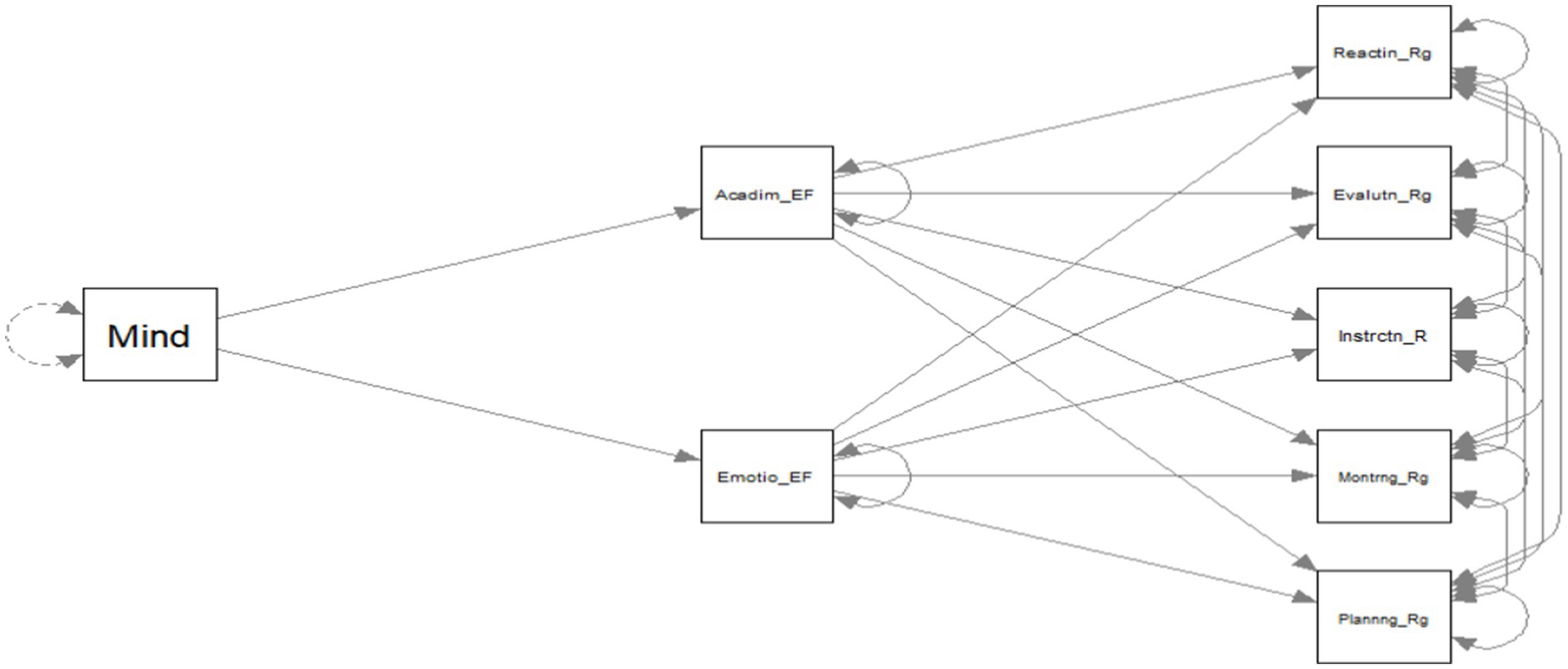
Figure 1. Relationships between academic self-efficacy, emotional self-efficacy, mindful attention-awareness, and students’ academic self-regulation.
Ethical consideration
The study procedures were based on ethical principles in scientific research. The scales used in the current study did not include items that conflict with cultural privacy. The first paragraph in each scale asked participants for their consent to voluntarily participate in the current study. They were informed that all data would be treated with complete confidentiality and would not be disclosed under any circumstances. We obtained ethical approval from the Research Ethics Committee at Al Ain University (Reference No.: COP/AREC/AN/25_1). We used a Google Form. We required participants to use their Google account to register, and we limited each user to submitting only one response. Participants were asked to provide their email address; this information was used solely to verify that responses were not duplicated. The email addresses were stored temporarily and then deleted after the verification process was completed.
Results
This study investigates the mediating roles of academic and emotional self-efficacy in the relationship between mindful attention-awareness and academic self-regulation among undergraduate students. The correlation matrix for these variables appears in Table 6.
Figure 1 presents the hypothesized structural model in which mindful attention-awareness predicts students’ academic self-regulation through dual mediators academic and emotional self-efficacy evaluated using path analysis.
Assessing the hypothesized structural model requires using several global fit indices. Table 7 presents the values and cutoff criteria of these indices. The accepted thresholds in structural equation modeling (SEM) of these fit indices are based on Hu and Bentler (1999) recommendations.
Reviewing the fit indices values and their accepted thresholds indicated that the data poorly fit the model. Therefore, the modification indices option under the Lavaan package was used to suggest changes to the model to increase the model fit. Reviewing the suggested changes showed that two changes can be made to improve the model, and they were illustrated in Figure 2. The first change was to delete the path (relationship) between mindful attention awareness and emotional self-efficacy as the coefficient is not significant, while the second change was to let academic self-efficacy and emotional self-efficacy correlate as the correlation between them is very high (r = 0.61).
Since the path between mindful attention awareness and emotional self-efficacy was deleted, and the high correlation between academic self-efficacy and emotional self-efficacy indicates high common variance between them, path analysis was conducted again by deleting emotional Self-efficacy from the model. The global fit indices of the final model are presented in Table 8.
The results in Table 8 indicate that the model fits the data. Therefore, the pairwise path coefficients were investigated, and the results are presented in Table 9; Figure 3.
Table 9 contains the path coefficients (Path Coef., standard error (SE), z value (Z), and the p-value) for every path in Model 4. The coefficients in Table 5 are categorized into two parts. The first part represents the path coefficients between the predicted variables, the five subscales of the academic self-regulation, and the mediator academic self-efficacy. One path coefficient is not statistically significant, which is the relationship between the self-evaluation subscale in the Academic Self-Regulation Scale and academic self-efficacy. The other four coefficients are statistically significant. This means that self-planning, self-monitoring, self-instruction, and self-reaction can be predicted by academic self-efficacy. The second part of the coefficients represents the relationship between the mediator academic self-efficacy and the mindful attention awareness, and this coefficient is statistical significant.
In summary, the findings provided evidence that academic self-efficacy mediates the relationship between the five subscales of academic self-regulation and mindful attention awareness, while emotional self-efficacy does not.
Discussion
The current study examined the relationship between mindful attention awareness and academic self-regulation among undergraduate students residing in different regions of the world, taking into account the mediating role of academic and emotional self-efficacy. We proposed a preliminary model to explain the relationship between the variables. Preliminary analysis indicated that the proposed model needed modifications. Therefore, we removed emotional self-efficacy from the modified model because its correlation with the remaining variables was not statistically significant. The final model showed that academic self-efficacy significantly mediated the relationship between mindful attention awareness and four of the five subscales of academic self-regulation (self-planning, self-monitoring, self-instruction, and self-reaction), while self-evaluation did not show any statistically significant relationship.
Discussion on the relationship between mindful attention awareness and academic self-regulation
Our results showed a pathway from mindful attention awareness to academic self-regulation mediated by academic self-efficacy, confirming previous research indicating that mindfulness reduces stress, improves memory, and develops self-regulation (Hayat et al., 2025). Consistent with previous studies, mindfulness appears to have a statistically significant effect on self-planning, self-monitoring, goal achievement, self-instruction, and self-reaction (Abdollahi and Isanejad, 2024; Khng, 2023; Ojell et al., 2023; Razza and Brann, 2025). Fan and Cui (2024) also supported the role of mindfulness in self-regulation, emphasizing the effectiveness of mindfulness practices in enhancing student engagement and learning in the academic setting.
Discussion on the relationship between mindful attention awareness and academic and emotional self-efficacy
The results showed that the relationship between mindful attention awareness and academic self-efficacy was statistically significant, but the relationship between mindful attention awareness and emotional self-efficacy was not. These results are consistent with previous studies that have shown a positive correlation between mindfulness and self-efficacy (Aldbyani et al., 2024; Badriyah and Hapsari, 2024; Karimi and Barati Hokabadi, 2025; Robin et al., 2025). The finding that academic self-efficacy significantly mediates the link between mindful attention awareness and academic self-regulation aligns with Badawy’s (2023) findings that mindfulness increases cognitive engagement, with the mediating role of academic self-efficacy. However, the absence of a significant correlation involving emotional self-efficacy in the present study differs from the findings of Menges and Caltabiano (2019). Possible reasons for this discrepancy in outcomes may be related to the overlap between emotional and academic self-efficacy, requiring further differentiation in future studies.
Discussion on the relationship between academic and emotional self-efficacy and academic self-regulation
The results of our study demonstrated the predictive role of academic self-efficacy across most subscales of academic self-regulation. This is consistent with previous research findings on the role of self-efficacy in promoting self-regulation in general (Koh et al., 2022; Kryshko et al., 2023; Salleh et al., 2021). More specifically, higher academic self-efficacy is associated with increased self-monitoring, self-planning, self-instruction, and self-reaction, which is consistent with the findings of Kılıç et al. (2024) and Schunk (1994). The analysis revealed no significant correlation between emotional self-efficacy and academic self-regulation. Emotional self-efficacy did not mediate the link between mindful attention awareness and academic self-regulation, because its associations with both variables were not statistically significant, which differs from the findings of Usán Supervía and Quílez Robres’s (2021) which indicated the impact of emotional regulation, through self-efficacy, on academic achievement. This difference in outcomes may reflect contextual conditions or measurement issues, and we recommend the importance of refining these concepts and investigating their relationship across different academic settings.
We believe that the findings of our study have implications for practical practice and educational psychology. Mindfulness intervention and training programs for undergraduate students can be implemented in their educational programs, enhancing cognitive flexibility and reducing stress, increasing self-regulatory behaviors important for academic success (Huang, 2021; Hayat et al., 2025). Educators can integrate mindfulness-based interventions that foster academic self-efficacy, which may increase students’ academic engagement (Farooq and Grewal, 2024; Badawy, 2023). Furthermore, highlighting the mediating role of academic self-efficacy reflects the importance of interventions to enhance students’ perceived academic competence, which enhances their academic self-regulation and overall achievement (Menges and Caltabiano, 2019; Usán Supervía and Quílez Robres, 2021).
We suggest that future studies work beyond the limitations of our study to address the dynamic relationship between mindful attention awareness, emotional self-efficacy, and self-regulation. The use of longitudinal or experimental designs would clarify intervention effects and causal relationships. We also recommend examining the impact of contexts on emotional self-efficacy, self-regulation and academic outcomes. Expanding the scope of research to include diverse academic contexts, cultures, and educational levels would enhance generalizability and deepen understanding. Finally, future studies could use different measures alongside self-report instruments to enhance the validity of outcomes.
Limitations and future research
Several limitations can be identified in our study. The research design may not provide causal explanations for the relationships between mindful attention awareness, academic self-efficacy, emotional self-efficacy, and self-regulation. Relying on self-report data may introduce biases such as social desirability, inaccurate recall, participants’ desire to present their best side, or their particular pattern in completing questionnaires. Furthermore, emotional self-efficacy is related to academic self-efficacy, and not be examined in the current research may not account for potential conceptual overlaps. Therefore, the relationship between emotional self-efficacy and academic self-regulation merits further investigation. Finally, the generalizability of the findings is limited by the participants’ unique cultural and academic context, highlighting the need for future research in diverse settings and populations. Some subscales showed insufficient internal consistency (e.g., ASRS Cronbach’s alpha = 0.47–0.62 and ASES –Stress Management Cronbach’s alpha = 0.54), which may raise concerns about measurement accuracy; overall reliability and fit statistics are shown in Table 2. The path between mindfulness awareness and emotional self-efficacy was removed, which may lead to a lack of clarity regarding the underlying mechanism; the sample was regionally concentrated (87% belonging to Asia) which may limit generalizability.
Data availability statement
The original contributions presented in the study are included in the article/supplementary material, further inquiries can be directed to the corresponding author.
Ethics statement
The studies involving humans were approved by the Al Ain University (AAU) research ethical committee (Reference No.: COP/AREC/AN/25_1). The studies were conducted in accordance with the local legislation and institutional requirements. The participants provided their written informed consent to participate in this study.
Author contributions
SH: Writing – original draft, Writing – review & editing. MA-Q: Formal analysis, Writing – review & editing.
Funding
The author(s) declare that no financial support was received for the research and/or publication of this article.
Conflict of interest
The authors declare that the research was conducted in the absence of any commercial or financial relationships that could be construed as a potential conflict of interest.
Generative AI statement
The author(s) declare that Generative AI was used in the creation of this manuscript. We used artificial intelligence to review the language in this manuscript. Artificial intelligence was not used in study design, data analysis, or interpretation of results.
Any alternative text (alt text) provided alongside figures in this article has been generated by Frontiers with the support of artificial intelligence and reasonable efforts have been made to ensure accuracy, including review by the authors wherever possible. If you identify any issues, please contact us.
Publisher’s note
All claims expressed in this article are solely those of the authors and do not necessarily represent those of their affiliated organizations, or those of the publisher, the editors and the reviewers. Any product that may be evaluated in this article, or claim that may be made by its manufacturer, is not guaranteed or endorsed by the publisher.
References
Abdollahi, B., and Isanejad, O. (2024) The effectiveness of mindful self-compassion (MSC) program on school burnout, academic self-regulation and academic resilience in secondary school students. J. Sch. Psychol. Inst. 12, 109–124. Available online at: https://jsp.uma.ac.ir/article_2798.html?lang=en
Akhtar, J., and Mahmood, N. (2013). Development and validation of an Academic Self-Regulation Scale for university students. J. Behav. Sci., 23. 37–48. Available online at: https://www.researchgate.net/profile/Nasir-Mahmood-17/publication/334626448.
Al Husaini, Y., and Shukor, N. Factors affecting students’ academic performance: a review. Soc. Sci. J. 12, 284–296. (2022). Available online at: https://www.researchgate.net/profile/Yousuf-Al-Husaini/publication
Al-Abyadh, M., and Abdel Azeem, H. (2022). Academic achievement: influences of university students’ self-management and perceived self-efficacy. J. Intelligence 10, 1–18. doi: 10.3390/jintelligence10030055
Aldbyani, A., Alhadoor, Z., and Al-Abyadh, M. (2024). Mindfulness, academic competency, and academic self-efficacy: a cross-sectional study. Psychol. Sci. Educ. 29, 126–135. doi: 10.17759/pse.2024290209
Alhadabi, A., and Karpinski, A. (2020). Grit, self-efficacy, achievement orientation goals, and academic performance in university students. Int. J. Adolesc. Youth 25, 519–535. doi: 10.1080/02673843.2019.1679202
Alyahyan, E., and Düştegör, D. (2020). Predicting academic success in higher education: literature review and best practices. Int. J. Educ. Technol. High. Educ. 17, 1–21. doi: 10.1186/s41239-020-0177-7
Azari, J., Livarjani, S., and Azmoodeh, M. (2024). Comparing the effectiveness of study methods and time management training on academic self-regulation among male and female students. J. Assess. Res. Appl. Couns. 6, 95–104. doi: 10.61838/kman.jarac.6.2.12
Badawy, R. (2023). Academic self-efficacy as a mediating variable between mental mindfulness and psychological and cognitive engagement of university students. Cypriot J. Educ. Sci. 18, 4318–4331. doi: 10.18844/cjes.v17i11.8218
Badriyah, N., and Hapsari, M. (2024). The relationship between mindfulness and self-efficacy in Mahasantri memorizing Qur’an with peer support being moderating variable. J. An-Nafs 9, 52–67. doi: 10.33367/psi.v9i1.5237
Bandura, A. (1977). Social learning theory. Prentice-Hall. Available online at: https://www.asecib.ase.ro/mps/Bandura_SocialLearningTheory.pdf
Bandura, A. (1986). Social foundations of thought and action: a social cognitive theory. Englewood Cliffs, NJ, USA: Prentice-Hall.
Bandura, A., and Walters, R. (1977). Social learning theory. Prentice-Hall. Available online at: https://www.asecib.ase.ro/mps/Bandura_SocialLearningTheory.pdf
Barnett, A. (2024). “Self-efficacy” in Encyclopedia of quality of life and well-being research. ed. A. C. Michalos (Cham, Switzerland: Springer International Publishing), 6235–6238.
Brown, K., Creswell, J., and Ryan, R. (Eds.) (2025). Handbook of mindfulness. New York, NY, USA: Guilford Press.
Brown, K., and Ryan, R. (2003). The benefits of being present: mindfulness and its role in psychological well-being. J. Pers. Soc. Psychol. 84, 822–848. doi: 10.1037/0022-3514.84.4.822
Bylieva, D., Hong, J., Lobatyuk, V., and Nam, T. (2021). Self-regulation in e-learning environment. Educ. Sci. 11, 1–23. doi: 10.3390/educsci11120785
Coo Calcagni, C., and Escartín Solanelles, J.. (2018). Less is more: the impact of mindfulness meditation on undergraduate students’ academic performance. In Gómez Chova, L., López Martínez, A., and Candel Torres, I. (Eds.), INTED2018 proceedings: 12th international technology, education and development conference (9057–9059). IATED
Dacre Pool, L., and Qualter, P. (2012). The dimensional structure of the Emotional Self-Efficacy Scale (ESES). Aust. J. Psychol. 64, 147–154. doi: 10.1111/j.1742-9536.2011.00039.x
Dai, X. (2024). A study on mindful agency’s influence on college students' engagement with online teaching: the mediating roles of e-learning self-efficacy and self-regulation. Acta Psychol. 243, 1–8. doi: 10.1016/j.actpsy.2024.104146
Fakılı, F., and Özdemir, N. (2024). Healthcare workers' anxiety levels and mindful attention awareness towards the COVID-19 pandemic. Sakarya University Journal of Holistic Health. 7, 23–35. doi: 10.54803/sauhsd.1330263
Fan, L., and Cui, F. (2024). Mindfulness, self-efficacy, and self-regulation as predictors of psychological well-being in EFL learners. Front. Psychol. 15, 1–15. doi: 10.3389/fpsyg.2024.1332002
Farooq, A., and Grewal, J. (2024). Study of relationship between mindfulness practice and academic achievement of secondary students. Int. J. Multidiscip. Res., 6. 1–6. Available online at: https://www.ijfmr.com/papers/2024/1/20478.pdf
González-Martín, A. M., Aibar-Almazán, A., Rivas-Campo, Y., Castellote-Caballero, Y., and Carcelén-Fraile, M. D. C. (2023). Mindfulness to improve the mental health of university students: a systematic review and meta-analysis. Front. Public Health 11, 1–23. doi: 10.3389/fpubh.2023.1284632
Greco, A., Annovazzi, C., Palena, N., Camussi, E., Rossi, G., and Steca, P. (2022). Self-efficacy beliefs of university students: examining factor validity and measurement invariance of the new Academic Self-Efficacy Scale. Front. Psychol. 12, 1–14. doi: 10.3389/fpsyg.2021.498824
Guo, J., Abu Talib, M., Guo, B., Ren, J., and Liu, J. (2025). The mediating role of satisfaction with life and social interaction anxiety in the relationship between loneliness and regulatory emotional self-efficacy. Behav. Sci. 15, 1–16. doi: 10.3390/bs15030392
Guo, W., Wang, J., Li, N., and Wang, L. (2025). The impact of teacher emotional support on learning engagement among college students mediated by academic self-efficacy and academic resilience. Sci. Rep. 15, 3670–3612. doi: 10.1038/s41598-025-88187-x
Ham, P. (2025). An academic self-regulation program for first-generation students in occupational therapy: a preexperimental study. Open J. Occup. Ther. 13, 1–22. doi: 10.15453/2168-6408.2254
Hayat, A., Soltani, R., Tazangi, T., Baradaranfar, F., Zareh, A., Norouzi, A., et al. (2025). Relationship between mindfulness, test anxiety, and academic performance among nursing students. J. Educ. Health Promot. 14, 1–6. doi: 10.4103/jehp.jehp_1501_23
Hj Ramli, N., Alavi, M., Mehrinezhad, S., and Ahmadi, A. (2018). Academic stress and self-regulation among university students in Malaysia: mediator role of mindfulness. Behav. Sci. 8, 1–9. doi: 10.3390/bs8010012
Hu, L., and Bentler, P. (1999). Cutoff criteria for fit indexes in covariance structure analysis: conventional criteria versus new alternatives. Struct. Equ. Model. 6, 1–55. doi: 10.1080/10705519909540118
Huang, S. Mindfulness relationship with people’s performance on academic problems. Lecture notes in education psychology and public media 1, 182–189. (2021). Available online at: https://web.archive.org/web/20220526220246id_/https://lnep.eliwise.ac/media/d6130e93709b47cb8bddeccebd593a29_IS1I7Dw.pdf
Hwang, Y., and Oh, J. (2021). The relationship between self-directed learning and problem-solving ability: the mediating role of academic self-efficacy and self-regulated learning among nursing students. Int. J. Environ. Res. Public Health 18, 1–9. doi: 10.3390/ijerph18041738
Karimi, A., and Barati Hokabadi, T. The effectiveness of cognitive therapy based on mindfulness on organizational intelligence and job self-efficacy. J. Sabzevar Univ. Med. Sci. (2025) 31, 804–815. Available online at: https://jsums.medsab.ac.ir/article_1688_en.html?lang=fa&utm_source=chatgpt.com
Keye, M., and Pidgeon, A. (2013). Investigation of the relationship between resilience, mindfulness, and academic self-efficacy. Open J. Soc. Sci. 1, 1–4. doi: 10.4236/jss.2013.16001
Khng, K. (2023). “Deep breathing and mindfulness: simple techniques to promote students’ self-regulation and well-being from the inside out” in Positive psychology and positive education in Asia: understanding and fostering well-being in schools. eds. H. Ho and D. Tan (Singapore: Springer Nature), 311–325.
Kılıç, M., Erduran Tekin, Ö., and Keçeci, B. (2024). Self-regulation and psychological resilience as predictors of the academic self-efficacy of university students. J. Comput. Educ. Res. 12, 403–421. doi: 10.18009/jcer.1448525
Knoke, D. (2004). “Structural equation models” in Encyclopedia of social measurement. ed. K. Kempf-Leonard, vol. 3 (San Diego, CA, USA: Elsevier/Academic Press), 689–695.
Koh, J., Farruggia, S., Back, L., and Han, C. (2022). Self-efficacy and academic success among diverse first-generation college students: the mediating role of self-regulation. Soc. Psychol. Educ. 25, 1071–1092. doi: 10.1007/s11218-022-09713-7
Kryshko, O., Fleischer, J., Grunschel, C., and Leutner, D. (2023). University students’ self-efficacy for motivational regulation, use of motivational regulation strategies, and satisfaction with academic studies: exploring between-person and within-person associations. J. Educ. Psychol. 115, 571–588. doi: 10.1037/edu0000785
Lee, W., Lee, M. J., and Bong, M. (2014). Testing interest and self-efficacy as predictors of academic self-regulation and achievement. Contemp. Educ. Psychol. 39, 86–99. doi: 10.1016/j.cedpsych.2014.02.002
Loehlin, J. C. (2004). Latent variable models: an introduction to factor, path, and structural equation analysis. New York, NY, USA; Print Lawrence. Psychology Press.
Ma, Y., and Ishak, Z. (2024). Cognitive strategy use and self-regulation as mediators between personality and academic achievement among Chinese undergraduates in Malaysia. J. Nusant. Stud. 9, 245–268. doi: 10.24200/jonus.vol9iss1pp245-268
Menges, J., and Caltabiano, M. (2019). The effect of mindfulness on academic self-efficacy: a randomised controlled trial. Int. J. Educ. Psychol. Couns. 4, 170–186. doi: 10.35631/IJEPC.4310015
Milaré, C., Lacerda, S., Barrichello, C., Tobo, P., Okuno, M., and Horta, A. (2025). Effects of a mindfulness training on self-regulation and social-emotional skills in basic education: perceptions of teachers, family members, and students. Estud. Psicol. 42, 1–19. doi: 10.1590/1982-0275202542e220113
Ojell, H., Palohuhta, M., and Ferreira, J. (2023). A qualitative microanalysis of the immediate behavioural effects of mindfulness practices on students’ self-regulation and attention. Trends Psychol 31, 641–664. doi: 10.1007/s43076-023-00263-1
Olckers, C., and Harumavamwe, M. (2025). The relationship between study resources, task performance and subjective wellbeing among university students: the role of academic self-efficacy as personal resource. Rev. Educ. 13, 1–20. doi: 10.1002/rev3.70023
Peteros, E. (2024). Impact of pre-service teachers’ self-regulation and self-efficacy on their mathematics performance in blended learning. J. Educ. Learn. 18, 526–534. doi: 10.11591/edulearn.v18i2.21074
Razza, R., and Brann, L. (2025). Integrating social emotional learning, mindfulness, and nutrition education into curricula to promote self-regulation and healthy eating behaviors among preschoolers. Soc. Emot. Learn. 1, 1–18. doi: 10.1016/j.sel.2025.100081
Robin, N., Carien, R., Anschutz, J., Bonnin, T., and Dominique, L. (2025). The beneficial effects of a mindfulness programme on self-efficacy, emotion management and tennis performance. ITF Coach. Sport Sci. Rev. 32, 26–33. doi: 10.52383/itfcoaching.v32i94.633
Salleh, R., Ismail, N., and Idrus, F. (2021). The relationship between self-regulation, self-efficacy, and psychological well-being among the Salahaddin university undergraduate students in Kurdistan. Int. J. Islam. Educ. Psychol. 2, 105–126. doi: 10.18196/ijiep.v2i2.12572
Schunk, D. (1994). “Self-regulation of self-efficacy and attributions in academic settings” in Self-regulation of learning and performance: issues and educational applications. eds. D. H. Schunk and B. J. Zimmerman (New York: Routledge), 75–99.
Travis, J., and Bunde, J. (2022). Self-regulation in college: the influence of self-efficacy, need satisfaction, and stress on GPA, persistence, and satisfaction. Curr. Psychol. 41, 6185–6195. doi: 10.1007/s12144-020-01091-7
Treves, I., Pichappan, K., Hammoud, J., Bauer, C., Ehmann, S., Sacchet, M., et al. (2024). The mindful brain: a systematic review of the neural correlates of trait mindfulness. J. Cogn. Neurosci. 36, 2518–2555. doi: 10.1162/jocn_a_02230
Usán Supervía, P., and Quílez Robres, A. (2021). Emotional regulation and academic performance in the academic context: the mediating role of self-efficacy in secondary education students. Int. J. Environ. Res. Public Health 18, 1–20. doi: 10.3390/ijerph18115715
Wasni, N. Z., Sembiring, D., Yusuf, M., Hendra, R., Febriyanti, E., and Rinda, P. (2024). The influence of emotional intelligence, self-efficacy, and learning motivation on student achievement. Edukasi 18, 105–120. doi: 10.15294/edukasi.v18i2.16416
Williams, D. (2020) Examining the impact mindfulness meditation on measures of mindfulness, academic self–efficacy, and GPA in online and on–ground learning environments. J. Transform. Learn. 7, 71–86. Available online at: https://jotl.uco.edu/index.php/jotl/article/view/247
Yang, S., Peng, H., Jing, L., Wang, H., and Chen, S. (2025). Exploring the association between physical activity, regulatory emotional self-efficacy, perceived self-burden, and social isolation among older adults in China. Healthcare 13, 1–16. doi: 10.3390/healthcare13060687
Yu, J., Huang, C., He, T., Wang, X., and Zhang, L. (2022). Investigating students’ emotional self-efficacy profiles and their relations to self-regulation, motivation, and academic performance in online learning contexts: a person-centered approach. Educ. Inf. Technol. 27, 11715–11740. doi: 10.1007/s10639-022-11099-0
Zammitti, A., Guarnera, M., Santilli, S., and Magnano, P. (2025). Who are the models of self-efficacy? Research with students of different ages. J. Psychol. Couns. Sch. 35, 1–19. doi: 10.1177/20556365251320512
Zhang, T. (2024). Effects of self-regulation strategies on EFL learners’ language learning motivation, willingness to communication, self-efficacy, and creativity. BMC Psychol. 12:75. doi: 10.1186/s40359-024-01567-2
Zheng, B., Chang, C., Lin, C. H., and Zhang, Y. (2021). Self-efficacy, academic motivation, and self-regulation: how do they predict academic achievement for medical students? Med. Sci. Educ. 31, 125–130. doi: 10.1007/s40670-020-01143-4
Zou, W., and Chen, S. (2025). Teacher-expressed humility and students’ learning motivation: the mediating role of academic self-efficacy and the moderating role of teacher ability trustworthiness. Asia Pac. Educ. Res. 34, 315–326. doi: 10.1007/s40299-024-00856-z
Keywords: academic self-efficacy, academic self-regulation, emotional self-efficacy, mindfulness, undergraduates
Citation: Abdel Hadi S and Al-Quraan M (2025) The mediating role of academic and emotional self-efficacy in the relationship between mindful attention awareness and academic self-regulation. Front. Educ. 10:1673113. doi: 10.3389/feduc.2025.1673113
Edited by:
Annalisa Valle, Catholic University of the Sacred Heart, ItalyReviewed by:
Jeff Bolles, Francis Marion University, United StatesEnrique H. Riquelme, Temuco Catholic University, Chile
Copyright © 2025 Abdel Hadi and Al-Quraan. This is an open-access article distributed under the terms of the Creative Commons Attribution License (CC BY). The use, distribution or reproduction in other forums is permitted, provided the original author(s) and the copyright owner(s) are credited and that the original publication in this journal is cited, in accordance with accepted academic practice. No use, distribution or reproduction is permitted which does not comply with these terms.
*Correspondence: Samer Abdel Hadi, c2FtZXIuYWJkZWxoYWRpQGFhdS5hYy5hZQ==
 Samer Abdel Hadi
Samer Abdel Hadi Mahmoud Al-Quraan
Mahmoud Al-Quraan